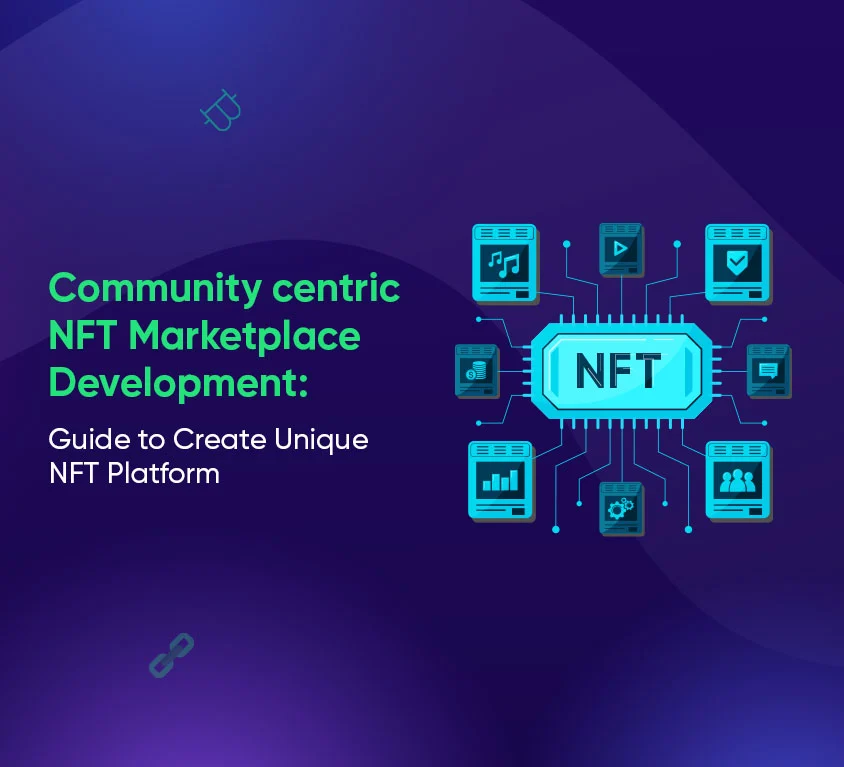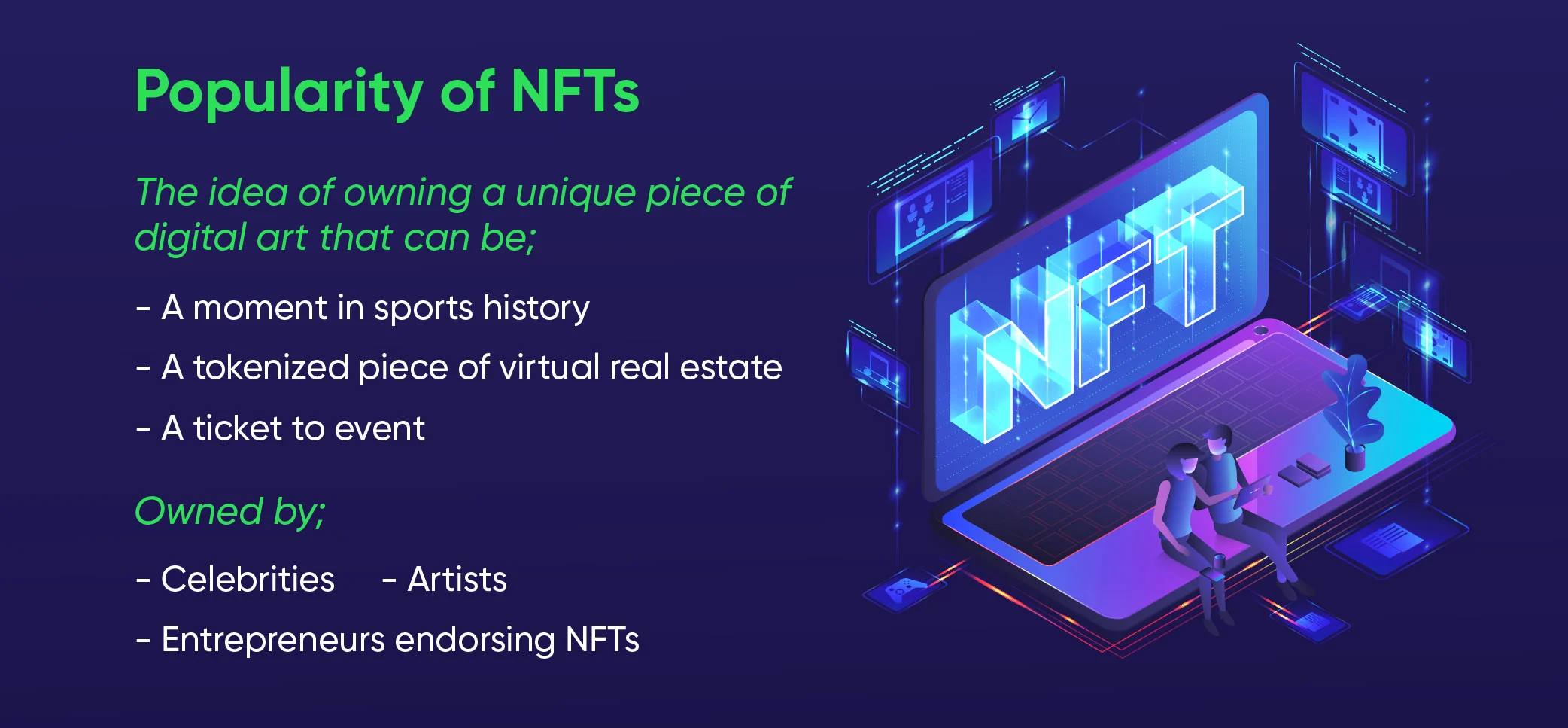
Introduction
Web3 & Blockchain Consultancy :
Community Centric NFT Marketplace Development: Guide to Create Unique NFT Platform
Blockchain technology knows no bounds. With the rise of blockchain technology, many of its applications came into the spotlight, one of the well-known is NFT. The rise of NFTs, or Non-Fungible Tokens, has been nothing short of revolutionary. From digital art and collectibles to real estate, NFTs have disrupted traditional industries and unlocked new possibilities. Apart from this, creativity and digital ownership, community-centric NFT marketplaces have emerged as a powerful force, driving the movement towards decentralized, peer-to-peer ownership.Key Takeaways
- Community-centric NFT marketplaces empower creators and collectors, fostering collaboration and support.
- NFTs rule the digital world, making unique digital assets valuable, backed by celebrities and artists.
- NFTs are unique, one-of-a-kind digital ownership certificates, that ensure authenticity.
- NFTs transform art, gaming, collectibles, and education, changing how we own and trade digital and physical assets.
- A strong NFT platform foundation includes smart contracts, blockchain, wallets, metadata, and tailored features.
- Protect your platform and users with secure wallets, encryption, strong authentication, audits, and user education.
- Leading NFT marketplaces like OpenSea, Rarible, SuperRare, Decentraland, and Zora offer diverse features and user bases.
- Building a community-centric NFT platform requires vision, user-centric design, engagement, content support, rewards, governance, partnerships, events, adaptation, and scalability.
- Diversify revenue streams, consider native tokens, invest in marketing, follow legal guidelines, and stay updated on NFT trends to ensure platform sustainability.
What is a Community-Centric NFT Marketplace?
A Community-Centric NFT Marketplace is for creators and collectors. It’s a space where the community plays a role in curating, creating, and trading NFTs. Here, the bonds formed among creators and collectors are as valuable as the NFTs themselves. These marketplaces are designed to empower the people, offering a platform for artists, enthusiasts, and investors to engage, collaborate, and prosper. The emphasis is not solely on transactions, but on building a vibrant, supportive community around NFTs.
NFTs (Non-Fungible Tokens) Explained
NFTs represent ownership of unique digital or physical items, using blockchain as the technology backbone. Unlike cryptocurrencies such as Bitcoin or Ethereum, NFTs are not interchangeable on a one-to-one basis because each NFT has distinct characteristics that set it apart from others.NFT Use Cases
The versatility of NFTs is showcased through a wide array of use cases across various industries. Here are some notable examples:- Art and Creativity:
- NFTs have given artists and creators a new way to monetize their work.
- Digital art, music, and even virtual fashion items have found a home in NFT marketplaces, allowing artists to directly connect with collectors and fans.
- Gaming and Virtual Worlds:
- Gamers can own and trade in-game assets, characters, and skins.
- Virtual worlds and metaverse platforms enable users to buy virtual real estate and other digital properties, creating unique, immersive experiences.
- Entertainment:
- Musicians can release limited edition albums or concert tickets as NFTs, offering special access to fans.
- Collectibles:
- From trading cards to virtual collectibles, NFTs have redefined the concept of collecting. Unique items with verifiable scarcity are highly sought after by collectors.
- Education and Certifications:
- Academic credentials, certifications, and degrees can be securely stored as NFTs, providing an unforgeable record of achievements.
The Foundation for Your NFT Platform
To create a Community-Centric NFT Marketplace that thrives and stands out in the competitive NFT ecosystem, you need a rock-solid foundation. This section covers the essential building blocks for your NFT platform:- Smart Contracts: Smart contracts are the foremost thing you need for any NFT platform. These contracts are automated and self-executing agreements coded into the blockchain that manage the creation, transfer, and trading of NFTs. Smart contracts ensure trust and security, making transactions transparent and tamper-proof.
- Blockchain Technology: It is essential to select the right blockchain for your NFT platform. In addition, Ethereum, Binance Smart Chain, Flow, and other blockchains offer unique features. Your choice affects transaction speed, scalability, and costs. One must consider the blockchain that aligns best with your platform’s goals.
- Digital Wallets: It is essential for users to get a digital wallet to store, buy, and trade NFTs. in addition, these wallets act as secure repositories for digital assets and provide a user-friendly interface. One must Choose or develop a user-friendly digital wallet solution to ensure a smooth user experience.
- Metadata and Storage: Each NFT contains metadata, including descriptions, images, and additional details. Properly managing and retrieving metadata is crucial for an engaging user experience, as it enhances the attractiveness and accessibility of your NFTs.
- Marketplace Features: One must decide on the features you’ll offer in the community-centric marketplace. Will you include auctions, bidding, instant sales, or tools for community engagement? Furthermore, the design and functionality of your platform should align with your community-centric approach, catering to the needs and desires of your users.
- Gas Fees and User Experience: High gas fees on certain blockchains can be a deterrent for users. Explore solutions to minimize transaction costs while optimizing the overall user experience. As a result, this includes strategies for optimizing your platform’s performance and responsiveness.
Security Considerations for Best NFT Marketplace
Let’s explore some security considerations to protect your platform and its users:- Secure Wallets: Encourage users to utilize secure, reputable digital wallets for their NFT holdings.
- Data Encryption: Implement strong encryption to protect sensitive user data, such as private keys.
- Authentication and Authorization: Employ robust authentication and authorization mechanisms to prevent unauthorized access to accounts and NFTs.
- Audit and Testing: Regularly audit and test your platform for vulnerabilities. Employ security experts to identify and address potential risks.
- User Education: Educate users on best security practices, including how to safeguard their digital assets.
The Best NFT Marketplaces
Choosing the right marketplace to launch your NFTs is as important as the security. Let us provide an overview of leading NFT marketplaces, explore their features, fees, and user base, and offer insights to help you decide which platform aligns best with your goals. Here are some of the leading NFT marketplaces:-
OpenSea
Specialization: General NFT Marketplace
Unique Features: OpenSea is one of the largest and most popular NFT marketplaces, offering a wide range of digital assets, including art, virtual real estate, music, and more. It is known for its user-friendly interface and extensive user base.
OpenSea Fees:
-
- OpenSea charges a 2.5% fee on primary sales, which goes to the platform.
- Additionally, a 2.5% fee is charged to creators on secondary sales.
- Gas fees, associated with blockchain transactions, are also a consideration, as they can vary based on network congestion.
-
Rarible
Specialization: Creator-Centric Marketplace
Unique Features: Rarible places a strong emphasis on empowering creators. It allows artists to create their own NFTs and customize them. Additionally, Rarible’s governance token, RARI, enables community-driven decisions.
Rarible Fees:
-
- Rarible charges a 2.5% fee on primary sales, similar to OpenSea.
- Gas fees are also applicable to transactions on the Ethereum network.
-
SuperRare
Specialization: Digital Art Marketplace
Unique Features: SuperRare is a high-end marketplace dedicated to digital art. It’s known for its exclusivity and features a curation system, ensuring a certain level of quality and uniqueness in the art offered.
SuperRare Fees:
-
- SuperRare’s fee structure is more complex. It includes a 3% fee on primary sales, a 10% fee on secondary sales, and a 15% fee for the artist on secondary sales.
- Like other Ethereum-based platforms, it is subject to gas fees.
-
Decentraland Marketplace
Specialization: Virtual Real Estate and Assets
Unique Features: Decentraland is a metaverse where users can buy, sell, and build on virtual land. Its marketplace allows users to trade virtual real estate and assets within this digital world.
Decentraland Fees:
-
- Transaction fees vary depending on the activities in the virtual world, including land purchases and asset trades.
- Fees are paid in MANA, Decentraland’s native cryptocurrency.
-
Zora
Specialization: Creator-Centric Platform
Unique Features: Zora is built around the concept of owning content. Creators can set dynamic pricing for their NFTs, and users can purchase content at fluctuating prices.
Zora Fees:
-
- Zora’s fees vary based on the pricing model chosen by the creator.
- It is structured to allow for more flexibility in how NFTs are priced and sold.
How to Build a Community-Centric Platform
Building a community-centric NFT platform is a step-by-step journey that involves several key processes. Here’s a breakdown of the process to create a thriving community of creators and collectors:- Define Your Vision: Start by defining your vision and mission. What values will your NFT platform uphold, and what kind of community do you want to cultivate? Your vision will set the tone for your platform.
- User-Focused Design: Prioritize user experience in the design of your platform. Ensure it is intuitive, engaging, and user-friendly. Collectors and creators should feel at ease when using your platform.
- Community Engagement: Actively engage with your community through social media, forums, and direct communication. Respond to feedback, address concerns, and build a sense of belonging among your users.
- Content Creation Support: Provide tools and resources to assist creators in minting and listing NFTs. Offer educational content and guides to help them navigate the NFT landscape.
- Reward and Recognition: Implement systems that reward active participation within your community. This can include recognition of top creators, exclusive content, or unique NFTs for loyal users.
- Moderation and Governance: Establish moderation policies and community guidelines to maintain a safe and positive environment. Transparent governance can involve the community in decision-making processes.
- Partnerships and Collaborations: Collaborate with artists, influencers, and other NFT marketplaces to expand your reach and attract new users. Partnerships can provide unique opportunities for growth.
- Events and Auctions: Organize events, auctions, and contests to keep the community engaged and excited. These activities can foster a sense of unity and competition.
- Continuous Improvement: Regularly gather feedback and data to make informed decisions about platform improvements. Adapt to the changing needs and expectations of your community.
- Scalability: Plan for scalability as your community grows. Ensure your infrastructure can handle increased traffic and transactions.